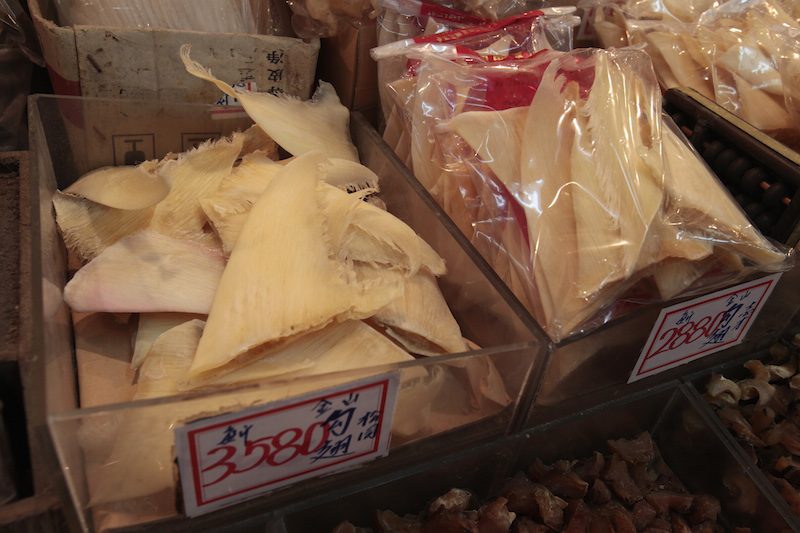Pungent piles of dried fish meat fill tiny shops on the ground floor of Phnom Penh’s Phsar O’Russei as the latest catch flops in metal basins. Hanging from some stalls are bags of half-meter long, leathery, dried shark fins—destined for expensive bowls of a soup prized for its taste and texture.
As a signatory to an international treaty to protect endangered species, Cambodia has made the sale of shark fins completely illegal. In practice, however, fins are sold openly and without repercussions from authorities.

At the latest meeting of the Convention on International Trade in Endangered Species of Wild Fauna and Flora (CITES) in Johannesburg last week, trade restrictions were adopted on four more species of sharks often traded for their fins: three species of silky sharks, and the thresher shark. Eight others were previously restricted.
The CITES restrictions come as the global shark population flickers closer to extinction. A report by the U.S.-based Pew Research Center released earlier this year says that 100 million sharks are killed annually, and populations of silky sharks and thresher sharks have declined by 70 to 99 percent in recent years.
Eng Cheasan, director-general of Cambodia’s Fisheries Administration, said the Ministry of Agriculture was aware of the convention’s restrictions—and also that the fin dealers were importing them illegally.
“So far, we have never given any permission to bring sharks or shark fins into Cambodia,” Mr. Cheasan said last week, adding that Cambodia has no mechanism for legally licensing such imports and that no hunting occurs offshore.
Those trading in the nation’s shark fin market say they’ve never been challenged and some were not aware of the laws banning the practice.
“These are the concern of the Fisheries Administration,” vendor Ly Hour said, gesturing at the dried fish meat on her stall in Phsar O’Russei. “Not the shark fins.”
Globally, many sharks are “finned” and thrown back into the water while still alive, said Matthew Pritchett, who works with Freeland, a Thailand-based NGO working to curb the wildlife trade in Southeast Asia. “It’s inhumane, the way they do it,” he said. “The shark can’t breathe if it can’t swim.”
In their role at the top of the ocean’s food chain, sharks are “critical to keeping an ecosystem healthy,” by controlling populations of smaller fish that would harm coral reefs and allow destructive algae blooms, Mr. Pritchett said. “They keep species in control.”
In Thailand, Freeland is encouraging hotels and restaurants to stop serving fins. But no NGOs are working on the problem in Cambodia, said Thomas Gray, director of science for Wildlife Alliance.
Mr. Pritchett declined to comment on how well Thailand—or any of its neighbors—were actually implementing CITES regulations at customs checks at airports, where customs officials face challenges in differentiating legal and illegal fins.
“There’s a bit of a gray area around the shark fin trade,” he said. “When you get the fins off, it’s hard to tell what species it is.”
Mr. Cheasan of the Fisheries Administration said Cambodia had never run checks on shark fin importers, because none were legal or had ever applied for a license.
Neither the Finance Ministry’s general department of customs nor Cambodia’s CITES authority responded to requests for comment.
Eng Laylong, a floor manager at Old Place Seafood restaurant on Monivong Boulevard, said that police officers and other authorities often ate in her restaurant and none had questioned the shark fin soup on the menu.
The restaurant buys the fins from China and sells its soup for $15 to $45 a bowl. Her customers “never say anything about it,” she said.
Ms. Hour said she buys her shark fins from many countries, including India and Australia, but never from China as they bleach the fins. “I don’t know if they have licenses, though,” she said.
“I used to sell a ton a month. Now it’s stopped. People don’t have the money for it,” she said, adding that she sells 30 to 50 kg of dried fins a month, at anywhere from $120 to $450 per kg, and enjoys shark fin soup as it gives her “good energy.”
When pressed, Mr. Cheasan admitted that, illegal or not, Cambodia had a trade in shark fins. But it was a small, hidden one, he contended.
“If you go to Hong Kong, say, you see them in the markets. But the people here, the restaurants—they hide their trade,” he said.
When asked if she thought her business would be affected by the new regulations, Ms. Laylong shook her head, retrieving the menu that lists the restaurant’s prices for the shark fin soup.
“We haven’t been in business a short time—it’s been many years,” she said. “The international community doesn’t affect it.”